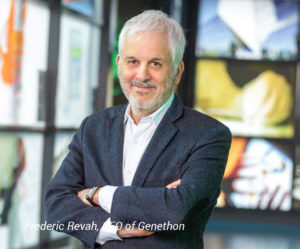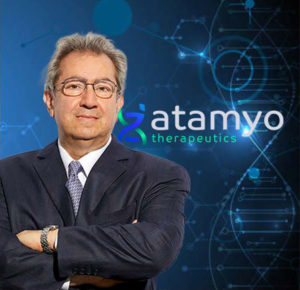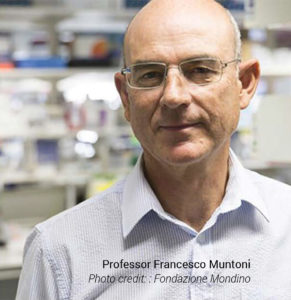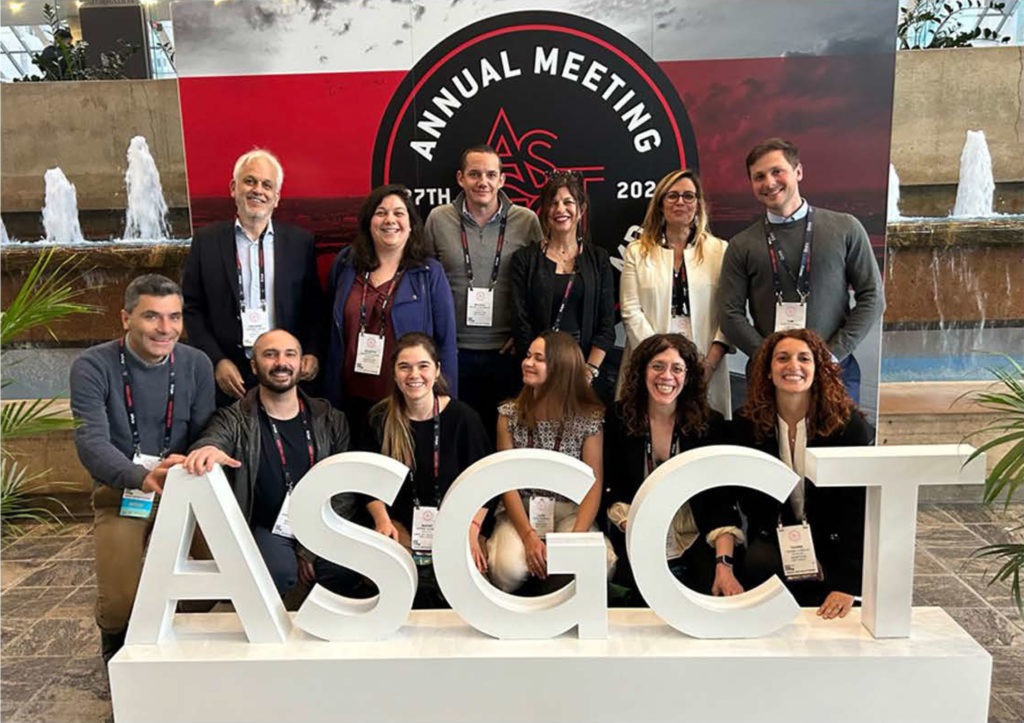Genethon newsletter – 2024 Issue Number 1
In this new issue, Frédéric Revah, Genethon’s CEO, reviews the results of gene therapy trial for Duchenne Muscular Dystrophy, sponsored by Genethon at Myology Congress and the advances of the Limb-Girdle Muscular Dystrophy trial with Atamyo, a Genethon’s spin-off.
Also discover recent news of our laboratory, including the creation of the GenoTher BioCluster, as Genethon is a founder, an unique ecosystem in France and in Europe to meet the scientific, technological, and economic challenges related to innovative therapies, particularly gene therapy.
Do not miss also our activities about research collaborations and scientific.
CEO Commentary
Positive Clinical Trial Results for DMD, LGMD Gene Therapies Highlighted at Myology 2024

The International Myology 2024 congress dedicated to the latest therapeutic advances for neuromuscular diseases, held in Paris from April 22 to 25, was a major event for al I researchers, doctors and patients concerned. lt once again highlighted Genethon’s role as a major player in the development of gene therapies for these devastating diseases.
The inaugural lecture was given by Professor Drew Weissman, MD, Ph.D, of the University of Pennsylvania’s Perlman School of Medicine. Dr. Weissman, co-laureate of the 2023 Nobel Prize for Medicine, shared exciting perspectives on the ongoing research that will allow the use of messenger RNA therapies for the treatment of muscle diseases. With this introduction, the tone was set for an exciting conference that brought together the best experts in the field.
For Genethon, Myology 2024 was an opportunity to report on the progress of several of our major projects currently in clinical development.
The first results of the clinical trial of our gene therapy product for Duchenne Muscular Dystrophy, GNT0004, were presented during a late breaking session by Professor Francesco Muntoni (University Col lege of London), who is the principal investigator of the trial. GNT0004 is based on the use of a reduced form of dystrophin (microdystrophin).
The results obtained in the dose-escalation study demonstrated good tolerability of GNT0004, combined with transient immunological prophylatic treatment, as well as efficacy data, both in terms of microdystrophin expression and functional improvement.
Notably, the effective dose in this first phase of the trial is lower than that used in other gene therapy programs using microdystrophin, which is one of the many attractive features of our approach aimed at this devastating disease. Based on the recommendation of the independent expert committee (Data Monitoring Committee), we are now preparing the pivotai part of our clinical trial in the EU.
We also provided an update on the latest clinical advances in our gene therapy product for the treatment of FKRP Limb-Girdle Muscular Dystrophy (LGMD-R9). The results presented for the first patient cohort in the dose escalation phase show positive evolution of the treated patients at the biological, histological and clinical levels.
This therapy is currently being driven by our spinout company, Atamyo Therapeutics, and the continuation of the trial in Europe and the US could allow for filing of a Biologics Licensing Application in 2027.
Product development
Gene Therapy Pioneer Dr. Roger Hajjar, Atamyo’s Newest Board Member, Offers His Perspective on the Company and Its Unique Business Model

As a spinout of Genethon, Atamyo Therapeutics represents what gene therapy pioneer and entrepreneur Roger Hajjar, M.D., describes as a new kind of biotech startup incorporating “bench to bedside” translation of laboratory research into gene therapies for patients.
The approach was a major attraction for Dr. Hajjar in joining Atamyo’s Board of Directors in July 2023. He is an internationally recognized research scientist in gene therapies for heart failure and cardiomyopathies, a co-founder of several biotech companies and currently director of the Gene & Cell Therapy lnstitute at Mass General Brigham in Boston.
‘What resonated with me was the fact that Atamyo is a research endeavor by investigators within Genethon whose work is being translated into the clinic,’ Dr. Hajjar said. “lt is a very nice demonstration of a bench to bedside approach. lt’s definitely a new model.”
What’s different is scientists take their discoveries into clinical development for the patients they have spent their careers trying to help. For Atamyo, these are patients suffering from rare genetic limb-girdle muscular dystrophies (LGMD). The
four-year-old start-up has AAV-based gene therapies in clinical trials for two kinds of LGMD; LGMD2C/R5 and LGMD21/R9.
The implication of this new model, Dr. Hajjar observed, is that Atamyo is creating a “platform where more therapies can come down the line for more neuromuscular patients so that the success of one commercial product will lead to a scientific stage where development of bench to bedside translation becomes easier for other diseases important to Genethon.”
Advances in AAV vectors
Another attraction for Dr. Hajjar is Atamyo’s advances in AAV-based gene therapy. “Most gene therapy companies in the neuromuscular space face the issue of toxicity based on high doses of AAV vectors that are deployed,” he explained.
“Atamyo has been able to calibrate their dosing just right so they get the beneficial effects for patients while at the same time avoiding major AAV toxicity.”
Dr. Hajjar has worked with AAV vectors in his research into gene therapies for heart failure and cardiomyopathies, conditions that affect the heart muscle. lt’s an area Atamyo also is exploring and one where he can offer his expertise. Many cardiomyopathies are associated with various rare genetic diseases, he said, and there is a “big unmet medical need in the cardiomyopathy space.”
Dr. Hajjar is also familiar with the challenges facing Atamyo, from fund raising to commercialization, including the debate over the staggering prices charged for treatments.
However one advantage for Atamyo is its association with Genethon, he suggested. “Genethon’s mission is patient centric,” he observed, “making sure that programs lead to tangible results for patients. lt’s a really great association because you always have a compass that’s leading you towards the patients’ wellbeing.”
First Clinical Trial Results of Gene Therapy (GNT0004) for Duchenne Muscular Dystrophy presented at International Myology 2024 Congress

Professor Francesco Muntoni, principal investigator of the international multicenter gene therapy trial for Duchenne Muscular Dystrophy with GNT0004 product, sponsored by Genethon, presented the innovative trial design and its initial results at the Myology 2024 international scientific congress in Paris April 23.
The trial combines Phases I/II/III with a dose escalation phase, followed by a pivotal phase at the selected dose. The trial has been approved by French and UK health authorities and includes ambulant boys aged 6 to 70 suffering from Duchenne muscular dystrophy.
Safety and pharmacodynamie results demonstrate good tolerability of GNT0004 in combination with transient immunological prophylactic treatment, as well as efficacy data in terms of both microdystrophin expression and functional improvement. Read the press release.
Research Collaborations
Genother, Biocluster in the Field of Gene Therapy Officially Launched
On March 25, founders and partners of GenoTher, the award-winning biocluster of the French Innovation Santé 2030 plan, gathered for the association’s first constituent assembly and board meeting. This key milestone marks the launch of GenoTher, and the creation of an ecosystem unique in France and Europe to meet the scientific, technological, and economic challenges related to innovative therapies, particularly gene therapy.
Created by its founders – Genethon, Genopole, Assistance Publique-Hôpitaux de Paris (AP-HP), lnserm, Université d’Évry Paris-Saclay, Spark Therapeutics and Yposkesi – GenoTher is a biocluster of excellence with strong ambitions, anchored in a region that is a pioneer in gene therapy. GenoTher aims to create a unique ecosystem to accelerate the development of gene therapy, from research to industrial production, to innovate in technology and biomanufacturing, promoting the creation and financing of start-ups specialized in the field, and to foster training for researchers and entrepreneurs in the sector. Read the press release.
US-Based Team Titin Awards lts First Research Grant to Genethon
Team Titin, a non profit organization with the mission of serving those living with, caring for, or researching titin (TTN) related muscle and heart disorders, awarded Genethon a grant of $50,000 to support a project titled, “Generation and characterization of skeletal muscle organoids from TTN patients’ iPSC for therapeutic screening.”
The program will be managed by Isabelle Richard, Ph D, Head of the “Progressive Muscular Dystrophies” team in collaboration with Sonia Albini, Ph.D., Research Fellow on the same team and Edoardo Malfatti, MD., Ph.D., Neurologist and Myopathologist at the University of Paris-Est.
Titinopathies are caused by a broad spectrum of muscle and/or heart disorders due to changes in the titin gene (TTN).
This giant protein (34350 ami no acids) plays a role in the stability and organization of the muscle cell. lt also works as a molecular spring for passive elasticity of muscle. ln the Genethon study, Dr. Richard and her team will examine the mutated titin proteins and their function, and then use the organoids to test treatments. Read the press release.
Scientific Publications
Genethon Evaluates a New Therapeutic Approach for Glycogen Storage Disease III
ln a study published in the The Journal of Clinical Investigation Jérémy Rouillon, a research engineer at Genethon and Antoine Gardin, a pediatrician and PhD student at Généthon, in the Immunology and Liver Diseases team led by Giuseppe Ronzitti, Ph.D., have designed an innovative strategy that provides a truncated version of the glycogen debranching enzyme (GDE) to correct the accumulation of abnormal glycogen.
Glycogen storage disease type Ill (GSDIII) is a rare genetic disorder caused by a deficiency of GDE. When it malfunctions, glycogene builds up and becomes toxic to the liver, muscles, and hear Gene therapy consists in delivering the therapeutic gene to produce the missing GDE protein in the organs affected by this disease. However, it faces a major challenge, imposed by the limited transport capacity of the vector used to deliver therapeutic genes to diseased cells – the vector derived from adeno-associated viruses (AAV). The glycogen debranching enzyme gene is too large (5300 nucleotides) to be fully packaged in an AAV vector (1 AAV = 4700 nucleotides).
Mr. Rouillon and Dr. Gardin, have developed a gene therapy strategy for GSDIII using a truncated but functional version of GDE, capable of being packaged and transported to diseased cells by a unique AAV vector. Read the press release.
Nature Reviews Drug Discovery
Highlights the Efforts of the US-Based Bespoke Gene Therapy Consortium
Leaders of the US-based Bespoke Gene Therapy Consortium, including Genethon CEO Frederic Revah, co-authored an article February 8, 2024, in Nature Reviews Drug Discover. Titled “The Bespoke Gene Therapy Consortium: facilitating development of AAV gene therapies for rare diseases”; the article highlights the consortium’s progress and lessons learned. (Subscription required)
The consortium also published February 6, 2024, its first playbook to accelerate development of AAV gene therapies for rare diseases.
The consortium is a public-private partnership bringing together the resources of the U.S. National Institutes of Health (NIH) and Food and Drug Administration (FDA) with biopharmaceutical companies and other non-profit groups. The goal is to speed development of customized (or bespoke) gene therapies for millions of people worldwide suffering from ultra-rare diseases. Genethon joined the consortium in 2022. Read the press release.
Genethon News
Genethon’s Scientists Featured in Multiple Presentations at American Society of Gene & Cell Therapy Meeting
Genethon scientists were featured in two oral presentations and five poster presentations at the 27th An nuai Meeting of the American Society of Gene and Cell Therapy (ASGCT), May 7-11, in Baltimore, MD.
“Gene therapy is a unique medical opportunity to treat currently untreatable diseases. Our presentations and posters demonstrate the breadth of Genethon’s gene therapy research and the dedication of our scientists to create new treatments for patients suffering from rare genetic diseases,” said Frederic Revah Ph.D., Genethon CEO
“With more than 200 scientists and professional staff, Genethon is a global leader in gene and cell therapies and is dedicated to helping make gene therapy a staple of 21 st century medicine.”
Oral presentations were made by Marine Laurent, a Ph. D. student in the Genome Editing Team led by Mario Amendola, PhD.; and Anne Galy, PhD. Dr. Galy also presented a poster.
Two posters were presented by Tiziana La Bella, Ph. D., a researcher on the Immunology and Liver Disease Team led by Giuseppe Ronzitti, PhD. Other posters were presented by Laura Palmieri, a doctoral student at Genethon, and Giulia Scalisi, Ph.D., a postdoctoral researcher at Genethon. Read the press release.


